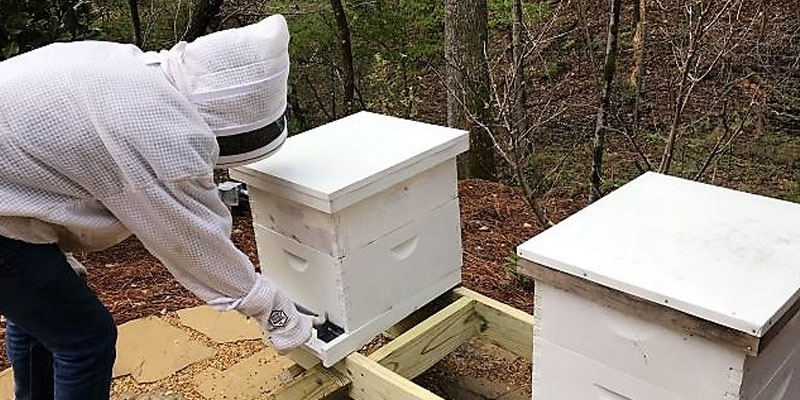Just call Adam Hickman the “bee whisperer.”
After five years in the beekeeping business, Hickman has learned most of the secrets of the trade. While some folks see beekeeping as a farming practice that’s fallen out of vogue, Hickman recognizes that managing bees is necessary to food production. He calls beekeeping a needed skill that’s as on-trend today as it was 50 years ago.
“We need more honeybees for our environment,” said Hickman, who fell into the business naturally. His great-grandfather in North Carolina kept bees.
“When he passed away, I got his old equipment,” said Hickman, who set up his first hive about eight years ago.
Through Foxhound Bee Co. of Birmingham, Hickman teaches beekeeping classes and tends bees for multiple clients, in addition to his own hives. He sells equipment such as the boxes to hold honeybees, and the suits and smokers used by beekeepers for tending their hives.
The business has been very successful, said Hickman, who earned a business degree from UAB and a culinary degree from Johnson & Wales. He also is a recipe developer and tester for a national food media brand. He and his wife, Stephanie, have two children and run Foxhound Bee Co. as a team. Though they sell raw honey made in Homewood and Hoover as a secondary product, their business is built on sales of equipment, tools and classes. Foxhound Bee Co. products include beekeeper suits, smokers, and long-lasting Cypress wood hives and stands.
“Our business has expanded each year as more and more customers come back,” Hickman said.
‘Honey do’: Creating apiaries for homeowners
In April, Hickman created an apiary for a Trussville homeowner whose woodsy acreage intersects near Camp Gertrude Coleman, operated by the Girl Scouts of North-Central Alabama.
He said that beekeeping from one’s home often isn’t practical, unless there’s enough space and plenty of flowering plants to support the hives. Wide-open areas are best, allowing the insects to make a “beeline” to and from their home.
“It’s got to work for the neighborhood, to set up hives in a community,” said Hickman, who manages hives in a subdivision in eastern Hoover, a local university and two other clients.
With some help from Daniel McCurry, a project manager for Father Nature Landscapes in Birmingham, Hickman set up a stand for two hives. He carefully measured the area, ensuring that it was level, then centered the wooden stand on which the hives would rest.
“Each hive has about 25,000 bees, with one queen that lays all of the eggs,” he said of the installation. “The worker bees take care of all the eggs, taking care of the young bees and going out and getting nectar and pollen, and coming back to the hive.”
Bees are kind of on “automatic” and take care of themselves, increasing in size during spring. One of a beekeeper’s main jobs is to manage the hive and ensure the bees aren’t overcrowded.
“Honeybees are really livestock,” Hickman said. “Sometimes they have a mind of their own. That’s what makes beekeeping interesting, because when you think you understand everything, that’s when they throw you a curve ball.”
Demystifying the ‘swarm’
Hickman compares the trade to farming, with honey as the delicious product.
“Beekeeping is like any farming – sometimes, if there’s a drought or it rains a lot, it’s more difficult,” he said. “There’s a moment for every beekeeper, when you have to say, ‘Is this what I want to be doing right now?’ because they’re less happy with you taking their honey.”
Hickman checks his hives every two to three weeks in the summer, especially when they are expanding.
During spring and summer, bees begin to “swarm,” with the queen leaving with half the bees. It’s not uncommon for homeowners to discover a swarm has made themselves a new home under a deck or in a tree. It’s best to call in experts to move a hive – some beekeeping club members will help relocate bees.
The good news is that there are no Africanized bees in Alabama. Hickman manages his hives, which he numbers, to prevent overcrowding of the hive and to ensure they have enough space.
“As a beekeeper, I’ve got to know the season, and know what they’ are going to do before they even do it,” Hickman said. “You’ve got to stay ahead of them.
“It’s really natural for them to divide the hive,” he said. “When bees swarm, they are the most passive they will be in their lifespan. The goal is to reproduce and spread their genes as they divide. Bees must swarm, or separate the colony, to reproduce. When the queen lays eggs, that’s the equivalent of our bodies making cells. They reproduce by swarming, not when the queen lays eggs.”
Hickman manages his hives conservatively, so the bees have what they need to make it through the winter. Harvesting the honey in late summer, he usually gathers enough honey to sell about 500 bottles starting in August, depending on the year and the number of hives. The honey usually sells out by November.
“I’ve got to plan for winter and make sure they have what they need to survive the winter, that they have enough food, so they don’t starve,” he said. “They don’t make honey for you and me – they make it for themselves to eat so they don’t starve when plants aren’t blooming.”
Sharing the love of bees
Beekeeping is an art that reaps delicious rewards, but it requires knowledge and skill to be successful.
To that end, Hickman teaches short and one-day beekeeping classes. His three-hour class covers the basics of setting up a bee hive, tools and the annual life pattern of bees in the Birmingham area. The one-day class provides students with the fundamentals to go from knowing nothing about honeybees to leaving prepared and excited about a new adventure. The 1.5-hour “beekeeping experience” allows the would-be beekeeper to suit up and experience the industrious, secret lives of bees.
Hickman’s focus is on teaching sustainable beekeeping practices that help safeguard the country’s troubled bee populations.
“I need to make sure I’m a responsible beekeeper and the bees have all their needs met first before we meet our own needs,” he said. “Part of being a good beekeeper is being a good steward of your bees.”
Foxhound Bee Co. can be found online and on Facebook, Twitter and Instagram.
(Courtesy of Alabama NewsCenter)













